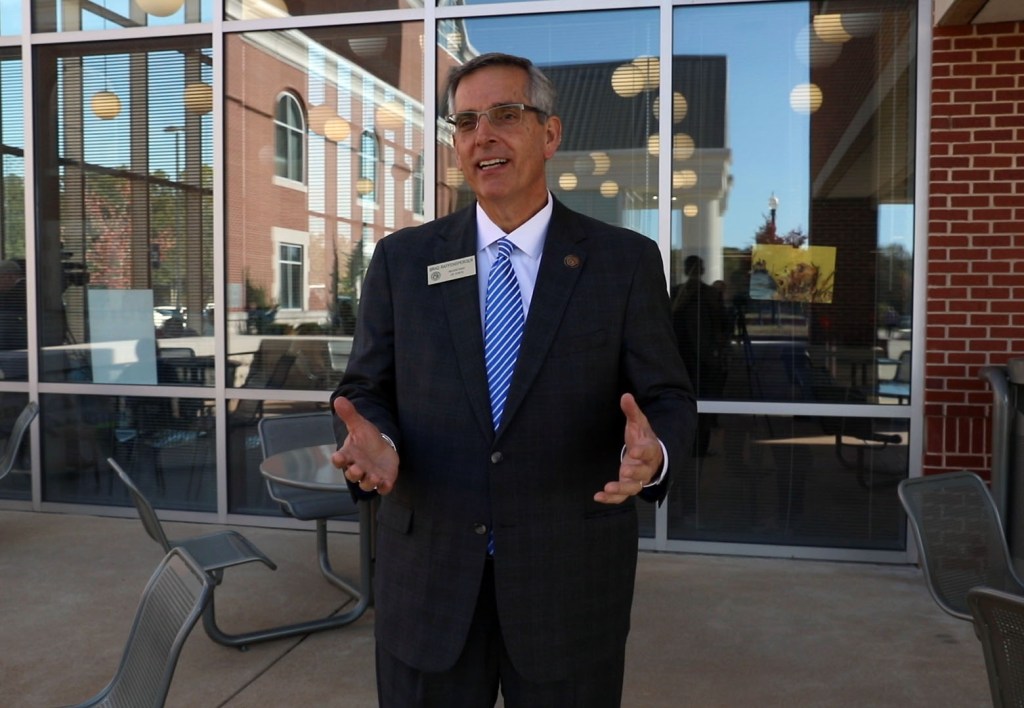State calls voting system failures ‘human error’
Published 1:00 pm Monday, November 18, 2019

- In this file photo, Secretary of State Brad Raffensperger visits Paulding County to talk about the new voting system being tested in six Georgia counties on Nov. 5.
ATLANTA — Elections officials attribute nearly all the issues with the state’s new voting system to “human error.”
During the Nov. 5 local elections, six counties tested the new touchscreen machines that generate a printed ballot — the first step in the rollout of state’s $107 million voting machine overhaul.
It is the first upgrade to Georgia’s voting system since 2002.
But the launch, of what is being called the biggest voting system overhaul in the nation’s history, didn’t go without flaws.
According to the Secretary of State’s office, there were 45 recorded “incidents” — problems with the machines — out of 27,482 votes cast. The state touted an incident rate of 0.164%.
Still, election results in at least one Georgia county were delayed by hours because of the breakdowns.
Nearly all of those 45 issues, officials told reporters last week, were human error or could be have been avoided through additional prior training of poll workers. Four touchscreens out of 576 and one scanner out of 83 were taken out of service during the election “out of an abundance of caution,” the state said.
Gabe Sterling, the secretary of state’s chief operating officer, said he was happy with results.
“If you do a pilot and nothing happens, my assumption is there is something really systemically wrong that we’re not seeing,” Sterling said. “So I was happy with what happened with the pilots. I was unhappy with the specific things that happened because they were human error and they were preventable, but the good part about that is that they were human error and they were preventable.”
Nine counties were selected to do the initial pilots: Bacon, Bartow, Carroll, Catoosa, Decatur, Evans, Lowndes, Paulding and Treutlen. Election officials from all the counties received three days of training with Dominion — the company contracted for the new system — along with Secretary of State staff. Bacon, Evans and Treutlen ended up not having municipal elections while Cobb volunteered to pilot the new system using hand-marked paper ballots instead of ballot marking devices.
Early problems with poll pads, officials said, were resolved within the first 20 minutes of voting. Each county, except Catoosa, the report says, had an issue as soon as the polls opened with the pads, used to check voters in.
Voters were incorrectly prompted to “pick a party,” an option that should not come up during non-partisan municipal elections.
The issue was discovered in most cases by 7:20 a.m. The Secretary of State elections officials ordered Dominion, the supplier, to do a universal reset of the system through a Wifi connection. All poll pads were functioning properly by 8:20 a.m., according to the report.
Lowndes County faced the worst problems, leading to hours of delay for the outcome of the mayor’s race. Elections officials told reporters memory cards generated by the touchscreen systems could not be read because all were incorrectly labeled “scanner 1,” leading to computer recognition errors.
Deb Cox, director of dlections for Lowndes County, told the Valdosta Daily Times the problem forced election officials to count paper ballots.
Sterling said all of the issues that occurred could be cured through poll worker training — there are backups in place that could have circumvented technical issues, he said, such as having voters fill out a paper ballot on the spot or using an access code to override incorrect messages.
“These people have been trained for 17 years that the paper ballot on Election Day is a provisional ballot and all those rules around it,” he said. “So what we have to train them now is that it is a live ballot that you can scan right now to make the process more proper. And that’s on us to train them, it didn’t occur to us before hand.”
Runoff elections in three of the pilot counties will hopefully go without flaws, he said. Valdosta’s mayor runoff will again make use of the touch screen voting system. The Smyrna mayor’s race and Smyrna ward 2 elections will use hand-marked paper ballots.
County debriefs have been scheduled and elections officials also told reporters last week all 159 counties have received or are scheduled to receive initial training on the new system. All 2,685 polling places are also being subjected to ADA compliance checks, which should be completed by January. The Georgia Department of Homeland Security is also conducting voluntary security checks.
The process of decommissioning old equipment has already began, with machines in 61 counties rounded up so far, according to officials.
Sterling said the Secretary of State’s office elections staff is “very confident” the kinks in the system will be resolved before the statewide rollout for the March 24 presidential primary.
“Overall we feel like we are in a good position to make sure these kind of issues don’t happen. But when you have an election with millions of people voting at one time, things are going to happen,” Sterling said, “it’s the backup, the preparation — you have to deal with those — that are going to make it be successful.”




